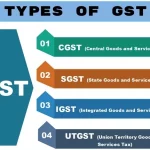Impact of GST on Consumers in India
Until 2017, the indirect tax structure in India was quite complicated. It was simplified with the introduction of GST in the country. GST not only combined all the taxes but also helped eliminate the cascading effect of tax and double taxation. The tax regime is now simpler and uniform across the nation. GST has certainly positively impacted Indian markets but what about the impact of GST on the consumer in India?
In short, we can tell you that GST has also had a positive impact on the consumer. The consumer doesn’t have to be worried about the different taxes on the invoice. They are clearer about the taxes that they need to pay when they are purchasing anything. In addition, GST has diminished tax evasion. We have talked about the impact of GST on consumers in detail in the section below. Go ahead and check it out now.

Impact of GST on Consumers
- Lowered Prices – If you are a part of the supply chain, then it is possible for you to take benefit from the input tax credit. This has led to an overall reduction in prices. In addition, many people don’t have to wait for the return of GST credit. Things are mostly automated now.
- Economic Growth – Since things became cheaper, there was a sudden increase in demand. This further leads to an increase in production and production capacity. There was more money in the economy, which was returned to the public through infrastructure projects and other cash injections.
- Reduction in Corruption – With the help of GST, there has been a reduction in corruption and tax evasion as well. Since the tax rates are lower, people don’t hesitate to pay the taxes. Apart from this, it is not possible to manipulate the tax rates. GST has also improved the tax collection of the government.
- Simplified Tax Structure – Before GST implementation, some cases were reported wherein the consumer was a victim of fraud. He was charged an additional tax rate or irrelevant tax without his knowledge. The GST has eliminated the problem as the consumer now understands the indirect taxes and knows that he should be charged GST at a given per cent.
GST: A Common Man’s Perspective
In this section, we will talk about the impact of GST on things that matter to the consumer and how the introduction of GST has impacted the pocket of the common man.
- Banking Services – The banking service became expensive as the government added a GST tax on the services.
- Car Price – The price of the cars got a healthy cut after implementing GST. Some cars got expensive, but in the base segment, the cars got cheaper. The impact of GST on the automobile sector was passed on to the consumer.
- Household Expense – Many basic items are under the 0% or 5% bracket; hence, the impact remains positive. However, the saloon services have become expensive because of GST on them. The net effect of GST on household expenses has been balanced.
- Jewellery – The GST on Jewellery was also increased by 1%, hence shooting up the price.
- Real Estate – After implementing GST, the service tax was eliminated from the residential rented property. However, the overall cost of purchasing real estate has been shot up. Moreover, the apartment with the completion certificate has been kept out of GST.
- Travel & Tourism – Talking about travel, taxi services got cheaper because of the price reduction. The train fare has not been impacted much, and the hotels in the luxury category experienced a higher tax rate. Air travel in economy class also became cheaper. Eating at restaurants has also become slightly cheaper.
Final Take
GST has proven beneficial for the consumer, but there are also some negatives. The government needs to take steps to simplify the GST filing process, and the government also needs to reduce the GST on the services. In addition, it has been noted that the benefit of GST or price reduction has not been passed to the consumer in many cases. Lastly, we strongly feel that petroleum and petroleum products should also come in the scope of GST. In such a case, a little more vigilance and slight modifications to the framework will benefit the consumer and the government.


